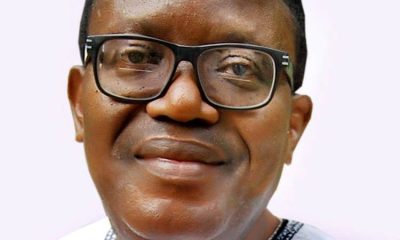Columns
Nigerians Remain Dispossessed After 64 Years of Independence
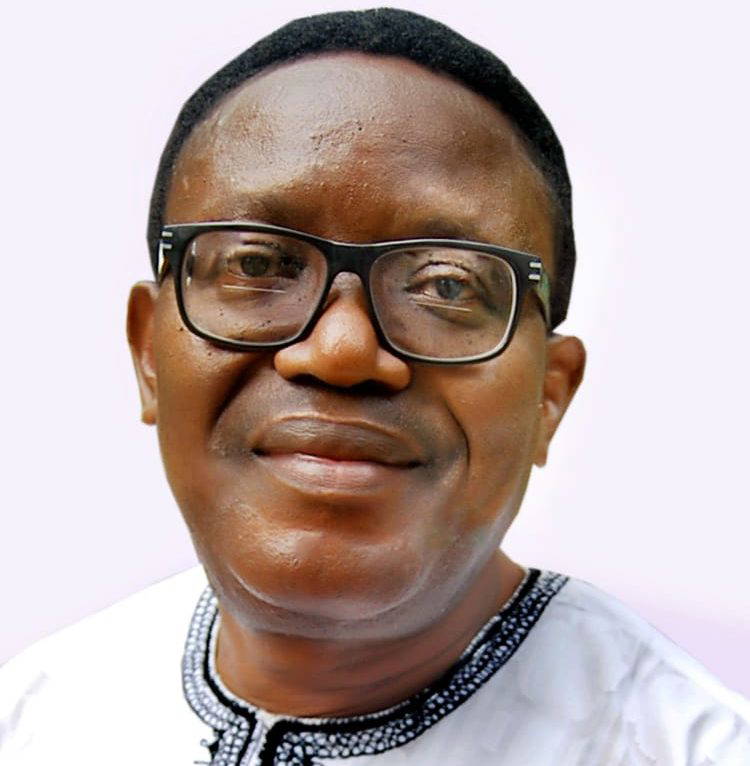
Nigerians Remain Dispossessed After 64 Years of Independence
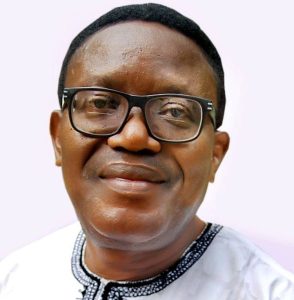
By Owei Lakemfa
Nigerians remain dispossessed after 64 years of independence, by Owei Lakemfa
Events of monumental proportions are happening in the world. The assassination of Hezbollah leader, Hassan Nasarallah, may signal the commencement of all-out war in the Middle East.
Those who love conquest would celebrate his elimination. Those who seek peace would recognise that his death drives humanity closer to an avoidable war.
Since we all agree that we now live in a global village, we should be concerned about such events in the world. But Nigerians are not prepared for such a fall-out.
Surely we have Nigerians living in Lebanon who would need protection. But we have no ambassador there who can protect out interest or keep us well informed. We also have no ambassador in Israel who can advance our interest.
Definitely, this is a proxy war in which the United States and its allies like France and Britain are providing Israel with logistics and timely intelligence which has always given it an advantage in armed conflicts with its neigbours. But we do not have ambassadors in any of those countries who can advance our views and interests. Nor do we have in Iran which is providing logistics and support for Hezbollah.
In fact, we have no ambassador anywhere in the world except in the United Nations system and Niger Republic.
Tragically, our best diplomats are at home, rotting away behind bare office desks, waiting to be posted. After one year of waiting, some of them may never make it to the pinnacle of their career as retirement may catch up with them.
Yes, the Tinubu administration has a Four-D foreign policy of Development, Demography, Democracy and Diaspora, but without ambassadors in a competitive world to make our case in various countries? We are concerned about Diaspora, but leave our citizens in all countries like sheep without shepherd. Then we stroll to the UN General Assembly podium to say we want to be a Permanent Member of the Security Council. Who will take us serious?
What is quite painful in this is that it was quite avoidable. We had ambassadors across the world when President Bola Tinubu was sworn in on May 29, 2023. After about four months, he recalled all of them with the perceived intention of replacing them. Now over one year later, he has either been incapable of doing so, or has not had the time. Why such self-inflicted injury by the so-called Giant of Africa?
It is also unlikely that this wound can be well treated this year because currently, the focus of the world is on UNGA, then our 64th Independence Anniversary and, we are approaching Christmas season or end-of-year activities. Again, even if new ambassadors are appointed today, they will need to undergo screening by the Senate, training and a period of acceptance by the receiving countries.
So, effectively, Nigerians are orphaned on the international stage.
We are also dispossessed in the country. Nigerians are a mass of alienated, hungry and angry people in a country so richly endowed with resources, including oil and gas and, unarguably, some of the best brains in the world.
We do not add value to our products like oil, are incapable of repairing existing refineries, yet go about destroying what are called ‘illegal’ refineries. In the last one year, the cost of petrol has gone up at least 400 per cent, yet we have to queue for hours to buy the product. We find ourselves being played like football between the new Dangote Refinery and the Federal Government. Talking about the latter, we live a lie that we have a federal system when what we run is a unitary system. A political system in which no group or nationality is happy or at ease.
Another lie is that we run a democracy when we are incapable of even conducting a state election successfully. We just had an election in Edo State where victory went to the highest bidder with ‘federal might’.
We know that the monthly allowances distributed in the National Assembly are illegal, that the constituency projects cannot stand the most rudimentary scrutiny and that our annual budgets are padded, yet we expect the same body to carry out oversight functions. Can a compromised National Assembly check the Executive or call public officials to order?
What, for me, is the most worrying is the growing insecurity in the land with terrorists, bandits and separatists over- running vast swathes of the country. But rather than concentrate on this serious challenge to life and property and the very existence of the country, the military is bogged down with diversions such as stopping public protests on the state of the country. Worse still, the generals bog themselves down with the conduct of elections. What was the business of the Chief of Defence Staff with the state election in Edo? What threat existed there that the police or Civil Defence could not handle? The misuse of the military for civil matters is a danger to the country’s democratic process.
The state of insecurity has become even more frightening after various accusations were made against the Minister of State for Defence, Bello Matawalle. Those making the accusations include the Governor of Zamfara State, Dauda Lawal, who accused his predecessor of keeping bandits in the Government House and receiving ransom on their behalf. Yet, all Matawalle could do was to swear by the Quoran.
Every aspect of our national life is down. The education sector is virtually in comatose and the cries of the Academic Staff Union of Universities, ASUU, about the sorry state of education in the country does not appear to have receptive ears in government.
As for the people, all they experience are astronomical increases in the prices of goods and services, more taxes and higher tariff for poorer services like electricity.
The country is in a mess and the government must know that people are no longer listening to the trite that things will get worse before they get better. That has been the sing-song of virtually every government since the overthrow of the Shagari administration on December 31, 1983.
Nigerians are a dispossessed people both abroad and at home. We need to review our policies, programmes and governance system. Africans say when a child trips and falls, he looks forward to see if there is anybody coming to help him, but when an elder trips and falls, he looks back to see what tripped him. After 64 years, we should look back to see why we are down. The Tinubu government should reassess its programmes and policies. To do this effectively, he needs to put together intellectually-endowed patriots who do not need his patronage. This advisory body can bridge the yawning gap between the government and the people.
Source: Vanguard News
Columns
Chief Denis Otuaro, the Guiding Star of PAP
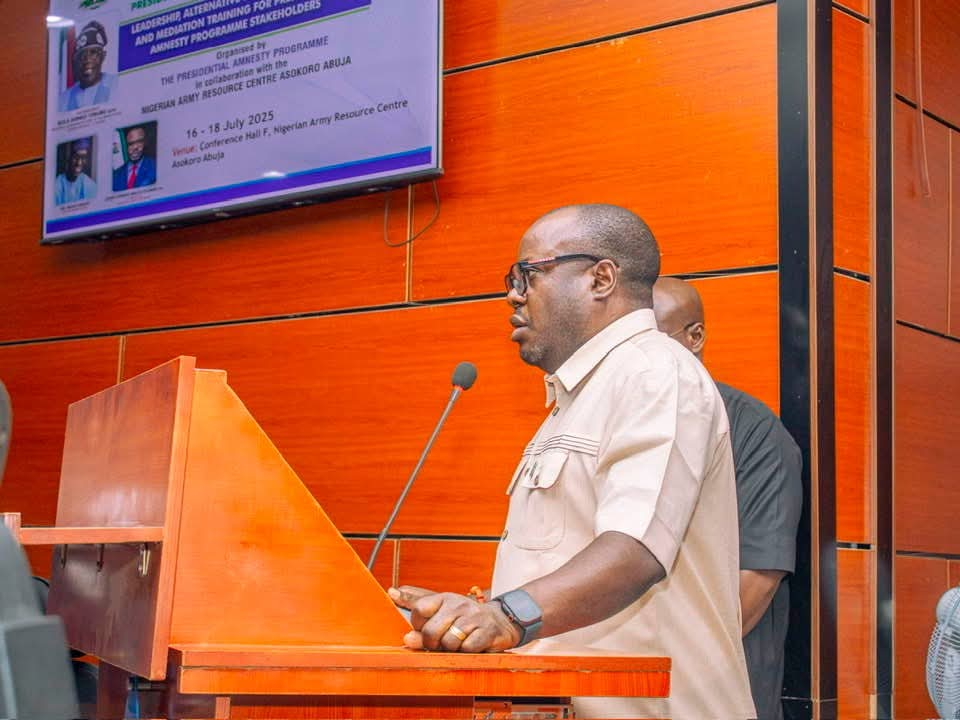
By: Professor Binebai
The Niger Delta has found a beacon of hope in Chief Dr. Dennis Otuaro, a leader of unimpeachable integrity, courage, and vision. As the helm of the Presidential Amnesty Programme (PAP), he has emerged as a champion of transformation, inspiring a region and a nation with his unwavering commitment to empowerment and progress.
In the realm of Nigerian leadership, there are those who leave an indelible mark on the sands of time, and Chief Dr. Dennis Otuaro is one such luminary. As the helm of the Presidential Amnesty Programme (PAP), he has etched a narrative of hope, redemption, and triumph, illuminating the path for the people of the Niger Delta. This tribute is a celebration of his extraordinary leadership, vision, and unwavering commitment to the cause of empowering the youths and transforming the region.
Chief Denis Otuaro’s stewardship of the Presidential Amnesty Programme (PAP) has indeed been a renaissance, a majestic sunrise after a long, dark night, as he infuses the initiative with the radiance of a new dawn.
Like the mythical Anansi, the wise and cunning spider of West African folklore, Otuaro’s leadership has woven an intricate web of hope and opportunity, capturing the challenges of the Niger Delta and transforming them into a rich mosaic of promise and progress. His vision, akin to that of the venerable Oracle of Delphi, has deciphered the complexities of post-conflict reconstruction, guiding the demobilised youths through the labyrinth of uncertainty, and into the bright light of empowerment and redemption.
Otuaro’s journey has been sustained by a resolute commitment to the cause, his leadership style a masterful blend of courage, wisdom, and compassion. His tenure has been marked by a symphony of progress, as the PAP, under his guidance, has orchestrated a harmonious balance of pacifism and pragmatism, transforming the region into a veritable Garden of Eden.
Like Athena, the Greek goddess of wisdom, Otuaro wields the power of transformation, his touch turning the arid landscape of despair into a lush oasis of hope and prosperity. His leadership has become a byword for sagacity, a testament to the transformative power of vision, courage, and compassion.
In the pantheon of Nigerian leaders, Otuaro’s name shall be etched alongside the greats, his legacy a shining testament to the indomitable human spirit, as he continues to weave a new narrative of hope, redemption, and triumph for the people of the Niger Delta.
The Niger Delta has found a leader of repute, a leader of courage, a leader of transformation, a leader of goodwill in the PAP. Let egocentric economic buccaneers and demonic agencies stop their campaign of calumny against this leader of glory.
To those who seek to undermine his efforts, we say: let envy and malice be silenced! Let the progress of the Niger Delta be the benchmark for greatness! Let Otuaro’s leadership be the inspiration for a new generation of leaders!
Columns
A Legendary Legacy: The Enduring Odyssey of High Chief (Dr.) Government Oweizide Ekpemupolo
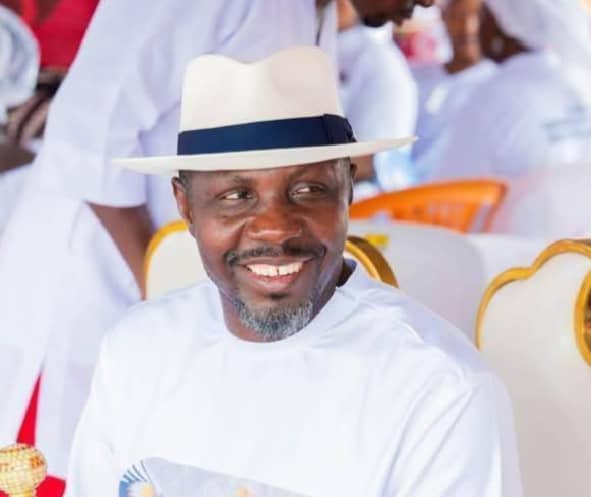
By: Professor Ben Binebai
In the realm of Nigerian leadership, one name resonates with mythical significance – High Chief (Dr.) Government Oweizide Ekpemupolo, affectionately known as Tompolo. Born on 12 April 1971, in Warri, Delta State, Tompolo has etched his name in the annals of history, leaving an indelible mark on the Niger Delta region. As a former militant commander of the Movement for the Emancipation of the Niger Delta (MEND) and chief priest of the Egbesu deity, he has navigated the treacherous waters of war and peace, leveraging his remarkable journey to bring succour and development to his people.
Tompolo’s metamorphosis from a militant leader to a peace advocate is a testament to his unwavering commitment to the progress of the Niger Delta. His decision to embrace the Amnesty Programme in 2009 marked a turning point, as he laid down arms and picked up the mantle of transformation. Today, he is revered as a hero, celebrated for taming the turbulent waters of the Creek boys and settling major political crises in the region. By putting the Ijaw image on the Nigerian map, Tompolo has redefined the narrative, showcasing the rich cultural heritage and resilience of the Ijaw people to the world.
A nationalist and statesman emerging from the boiling pot of agitation in the Niger Delta, Tompolo has consistently demonstrated his commitment to the development and progress of his people. His agency operates in close collaboration with the government, working tirelessly to implement projects and initiatives that benefit the Niger Delta region. His leadership style is characterised by quiet strength, strategic thinking, and an unwavering commitment to the progress of his people. His efforts have earned him recognition and accolades from various quarters, solidifying his position as a dependable pillar of the Ijaw nation.
As the last voice of the Ijaw nation, Tompolo’s legacy continues to inspire hope and progress for generations to come. With institutions established for national economic stability and prosperity, his impact will be felt for years to come. Tompolo’s story serves as a beacon of hope and resilience, inspiring his people to strive for greatness.
God bless this emergent leader of the Ijaw nation.
Columns
YOUNA: WARRI CRIES FOR PEACE AND JUJUSTICE
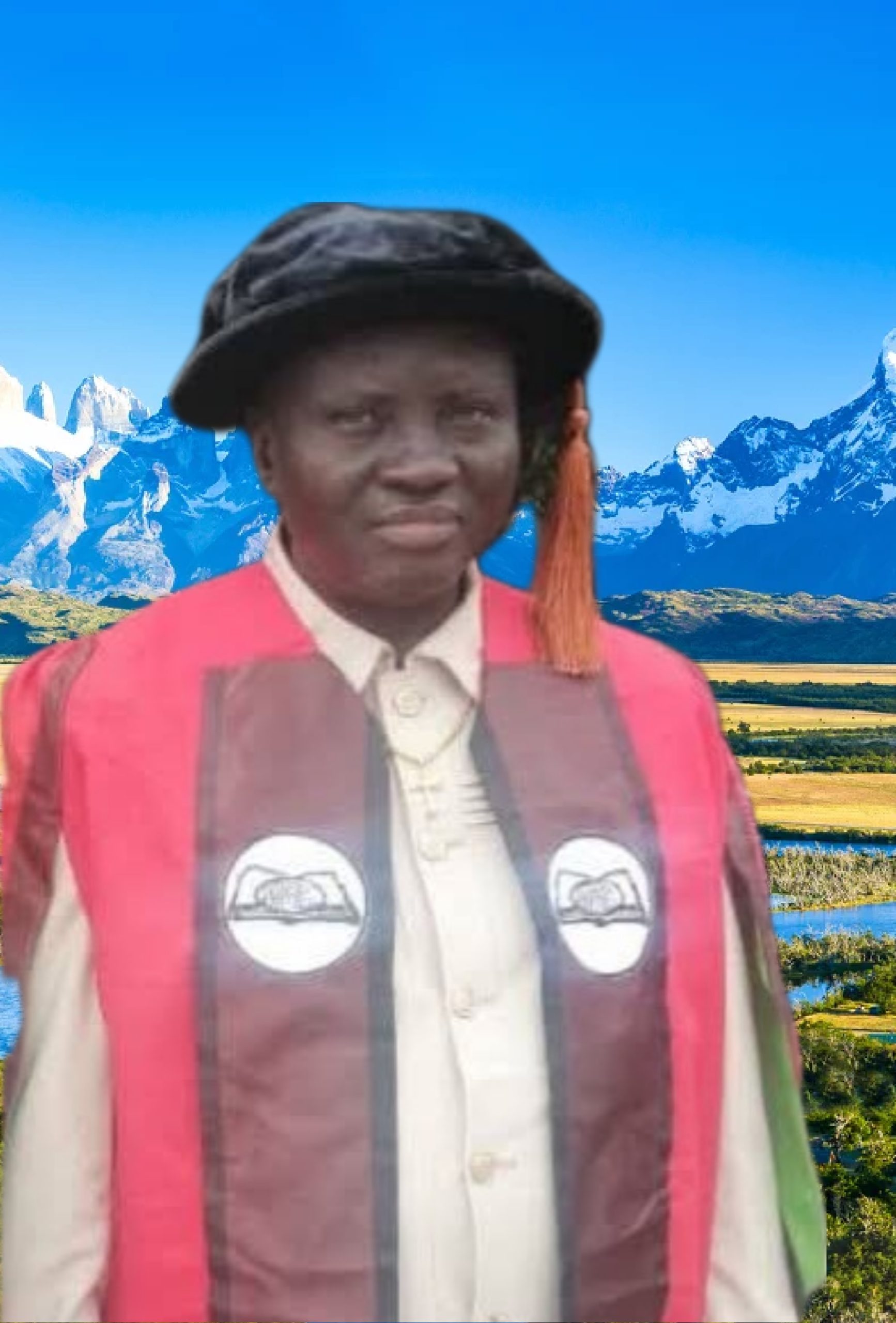
By: Ben Binebai
In the Niger Delta region of Nigeria, a city cries out for peace, justice, and unity. Warri, a land of rich cultural heritage and economic significance, has been plagued by recurring crises, sparked by provocative actions and claims of ownership by the Itsekiri group. The cry of Warri is a call to action, a reminder that our diversity is a strength, not a weakness, and that our common humanity is worth fighting for.
The Ijaw, Urhobo, and Itsekiri communities have coexisted in Warri for centuries, sharing a rich cultural heritage and a deep connection to the land. Occasionally uniting but deeply disunited because power and hegemony have often overshadowed their shared humanity, the people of Warri yearn for a future where their differences are celebrated, and their commonalities are the foundation of their unity. Warri’s significance extends beyond its current boundaries, as it has been a hub of economic and cultural activity for centuries. Before 1952, Warri was a thriving commercial centre, with the Ijaw, Urhobo, and Itsekiri communities contributing to its growth and development.
The city’s strategic location and access to the Niger Delta’s vast resources made it an attractive location for trade and commerce. Understanding Warri’s rich history and cultural heritage is essential to finding a lasting solution to the crisis.
It is time for truth to prevail to offer a lasting solution to the Warri crisis. The canoe of godfatherism should be withdrawn for the rule of law and for peace and progress to triumph.
The lie of exclusive ownership of Warri resists termination due to several factors, including:
Outdated court judgments: The Itsekiri establishment continues to rely on outdated court judgments, such as the 1925 judgment, to support their claim of ownership, despite subsequent judgments repudiating its validity.
Lack of political will: Successive governments have failed to address the problem and take the right and just decision, allowing the crisis to persist.
Absolutist claims: The Itsekiri claim is absolutist, while the Urhobo and Ijaw claims are limited, recognising ownership of portions of Warri by other communities.
Historical narratives can be deeply ingrained*: People’s understanding of their history and identity can be shaped by long-standing narratives, making it hard to change their perspectives.
Emotions and biases can override facts: When emotions and biases are strongly tied to a particular narrative, people may resist changing their views, even in the face of contradictory evidence.
Power dynamics can influence narrative control: Those in positions of power may use their influence to shape and maintain certain narratives, making it harder to correct lies and misconceptions.
Moreover, leadership plays a crucial role in shaping the future of Warri. As the saying goes, “When leaders refuse to embrace sacrifice, society dies.” Leaders who prioritise the greater good, make tough decisions, and invest in the future can help build a more harmonious and prosperous society. It is time for the leaders of Warri to put the needs of their people first and work towards a brighter future.
The cry of Warri is a call to action, a reminder that our diversity is a strength, not a weakness. Let us work towards a brighter, more harmonious future, where the beauty of our differences is celebrated, and our common humanity is cherished. May the cry of Warri be heard, and may we rise to the challenge of building a better tomorrow for all its people.

